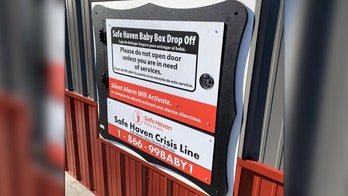
March 20: Labor, faith, youth leaders and immigrant advocates march in Washington, D.C., demanding legislative movement on immigration reform. (AP)
WASHINGTON -- Sixteen counties around the nation are the latest to join a federal-local law enforcement initiative to identify criminal aliens, prompting new debate about the effectiveness of federal deportation programs.
Since March 31, three counties in Maryland, one in California, one in Oregon, eight in North Carolina and three in Utah have been added to 142 other jurisdictions in 17 states participating in the Secure Communities initiative run by the Homeland Security Department's Immigration and Customs Enforcement agency.
The program cross-references an arrestee's fingerprints with FBI records and the Department of Homeland Security criminal history databases, instantly notifying ICE agents when illegal aliens are in local custody.
ICE officials said the initiative will help remove dangerous illegal aliens and, thereby, keep communities safe.
"We're focusing on deporting the most dangerous criminals to make our communities safer," ICE spokeswoman Gillian Brigham said. "Secure Communities provides us with an effective tool to target the population of criminal aliens."
Priority is given to criminals charged or convicted of Level 1, or violent, crimes, including rape, murder and kidnapping.
Since the program's inception in October 2008, ICE has removed 4,000 criminals guilty of Level 1 offenses from the country. Additionally, the department has removed more than 24,700 illegal immigrants charged or convicted of less-serious crimes, including burglary and property violations.
The Secure Communities initiative is a collaborative program between ICE and local law enforcement similar to the federal 287(g) program, which trains and authorizes local law enforcement to enforce immigration laws.
Frederick County, Md., participates in the 287(g) program and officials there have heartily endorsed the federal and local law enforcement partnerships.
"I positively embrace Secure Communities and look forward to the day when every community in the nation makes use of the program," said state Del. Charles Jenkins. "This program will complement ... the 287(g) program that has been tremendously successful in removing criminal aliens from Frederick County."
However, recent federal reports found major operational problems in the 287(g) program.
A Homeland Security Department inspector general's report showed local law enforcement officials were inadequately trained in immigration enforcement duties; civil rights considerations were not consistent; and goals were not being reached.
"With performance measures that do not focus on aliens who pose a threat to public safety or are a danger to the community, there is reduced assurance that the goal of the 287(g) program is being met," according to the March report.
Pro-immigrant advocacy groups fear the Secure Communities initiative will share the same problems.
"The Secure Communities program casts a huge net. Instead of finding the big fish that can cause real harm, thousands of dishwashers and busboys are caught in the net," said Enid Gonzalez Aleman of Casa de Maryland, an immigrant advocacy group.
Aleman, the senior manager of Casa's legal program, said federal programs that ask local law enforcement to do ICE's job burdens local police authorities and distracts them from keeping the communities safe.
But some who oppose immigrant amnesty and want tighter controls say federal programs are vital to community safety.
"It's another tool to use against criminals, like the MS-13 gang, Mexican mafia, and dangerous gangs that are proliferating the state and country," said Maryland state Del. Pat McDonough, a Republican.
Capital News Service contributed to this report.




